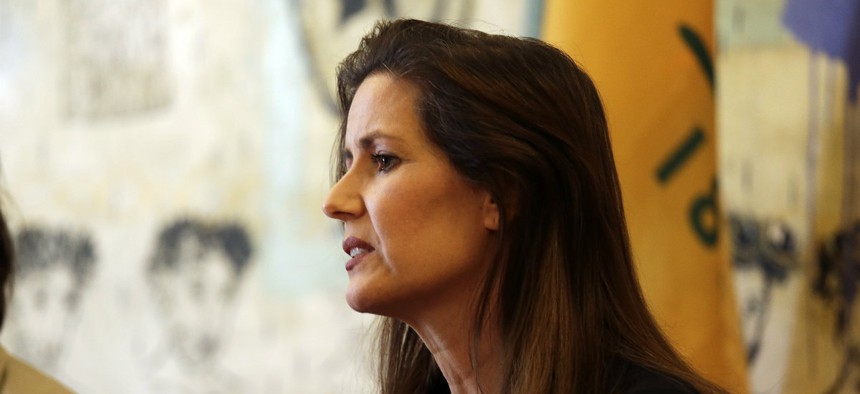Mayors: Yes, We Too

Oakland, Ca. Mayor Libby Schaaf. (AP Photo/Eric Risberg)
“Those of us who are women who hold power … we have a responsibility to share our stories.”
WASHINGTON — It probably goes without saying, but mayors are powerful people. But even mayors, women who are at the top of their field—at the pinnacle of municipal power—have experienced bias, sexism, and yes, abuse. So now, they’re saying “we too.”
When mayors from across the country gathered in the nation’s capital last week for the United States Conference of Mayors annual winter meeting, four municipal leaders took the stage to reflect on their own experiences and to share the ways in which this movement has touched their personal and professional lives.
For Elizabeth Kautz, the mayor of Burnsville, Minnesota, the memory of opening her first business came to mind. She tried to apply for a loan but was told she couldn’t get one without first getting her husband to sign on the dotted line. She refused.
“I argued and was able to get a loan to open my business without my husband cosigning for it,” she triumphantly told the audience gathered.
Mayor Libby Schaaf of Oakland, California said that she is struck now, thinking back on three points in her career. During a conference session, she said he remembered professors that took advantage of their positions of power. She recalled inappropriate conversations and unwanted sexual advances that at the time made her “question her intellectual accomplishments.”
“I was told to my face that I would never make partner because I was going to quit to have babies,” Schaaf said of the time she became an attorney at a big law firm.
And, the mayor added, “when I did have babies later in my career, I was told it was irresponsible for me to run for office because it would make me a bad mother and I would regret it for the rest of my life.”
For Victoria Woodards, the recently elected mayor of Tacoma, Washington, this type of reflection is relatively new. Her invitation to appear as part of the #MeToo panel made her see some of experiences in a new light.
“So often, as women, we try to act like the experience doesn’t happen to us.”
But, she said, “what happens to us is part of a culture.”
Woodard, who joined the military immediately after high school told the audience that the Me Too movement is making her reevaluate parts of that period of her life. She said that at the time, these sorts of issues were not what her fellow members of the military discussed because they were part of an “accepted culture.”
“How many of us have been in rooms where people say inappropriate things to us or we overhear something inappropriate said to someone else and we laugh it off because we don’t want to confront it?” asked Woodard.
“It makes me think about the responsibility I now have … to speak up when I hear it and when I see it and not just to brush it under the rug.”
But these women also acknowledged that speaking up isn’t easy. Schaaf admitted that talking about her experiences in public initially made her feel a embarrassed and uncomfortable.
Salt Lake City Mayor Jackie Biskupski, who made history when she became the first openly-gay person to be elected to a state office in Utah in 1998, told the audience: “I found it easier to come out as openly gay in the mid-’90s than I did coming out and letting it be known that I was a victim of rape in college.”
“Those parallel paths of owning my identity and my history really didn’t come to full fruition until this movement,” Biskupski said. “It’s because of this movement that I was empowered to speak on the steps of the capital and make it known that I am a survivor.”
That sentiment, that now is the time to speak up, was echoed by each of the mayors on the dais. And, these women emphasized that their status as mayors is part of what gives them an extra push to add their voices to the growing Me Too chorus.
Mayor Schaaf put it this way:
“Those of us who are women who hold power … we have a responsibility to share our stories even though it’s uncomfortable because we are in a place of power. We get believed, when so many women who have come before us have not had that privilege, of just being believed.”
Quinn Libson is a Staff Correspondent at Government Executive’s Route Fifty and is based in Washington, D.C.
NEXT STORY: The Baltimore Police Department Is Badly Broken






